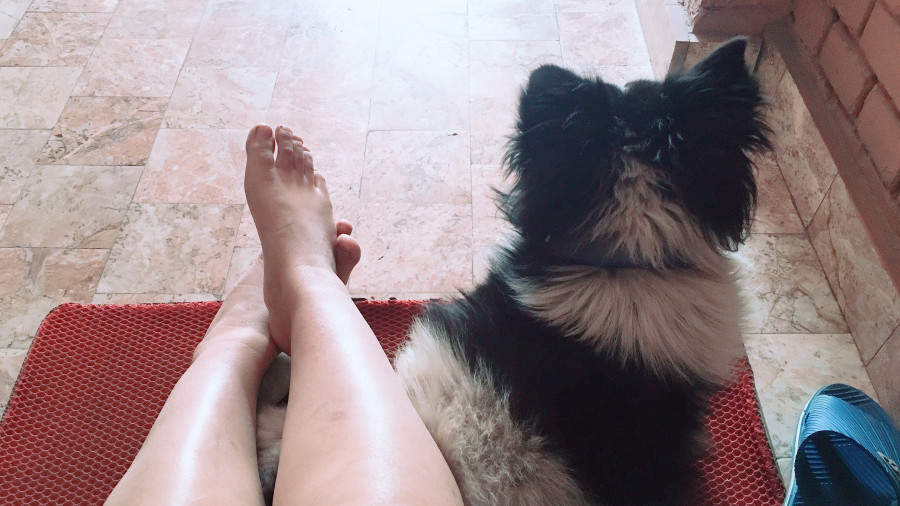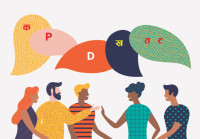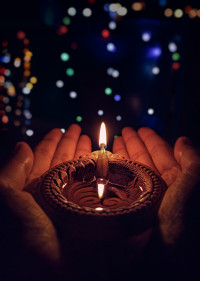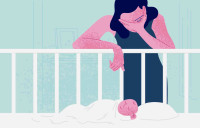As it is
The thing about raising a dog
The purpose of a dog is not to be good but to be just themselves.
Srizu Bajracharya
Almost nine years ago, my mother brought a puppy home. She said the puppy was a Tibetan Mastiff. I remember being on cloud nine with my two elder sisters, after all, he was the first ever breed dog for our family. We named him Bhunte, but it was on the third year that we found out that he was not a Tibetan Mastiff, for he had a shrieking bark sound, and he wasn't even half the size of the breed we believed he was.
Bhunte is short and fluffy and has golden-brown eyes. He doesn't like strangers’ hands on him and is a quite protective dog. And so, he doesn't fall under the cute dogs category: he is just himself, smug and serious and not at all fun-loving.
Growing up, there was never a time when dogs weren't around in our house. We always had one or two. There was Tinku, Haku (black in Nepal Bhasa), Tuyoo (white), another Haku (who later became brown), Punte and Clipper. Still, Bhunte is special as he is nothing a dog is supposed to be.
We are a family of five and Bhunte has bitten us all over the years. And I think part of the reason for this is because he grew up that way and maybe because we raised him doing all the wrong things.
When he was a puppy, we really enjoyed watching him get angry. We would tickle him with a feather, roll him down every time he would try to lift his little body, play tug of war, we would touch his nose. His little “grr…” was reason for our laughter, it was cute. And that habit of “grr…” stuck as he grew up. Bhunte retreats to the level of our voices with his growl, at a typical pitch he will ignore you, and on a higher pitch he will snap at you. And that's how it has always been.
My fufu bajai describes him as a dog bloated with pride, who knows how to protect himself—but Bhunte is actually very sensitive. He can feel people’s vibes, and he absolutely hates kids.
But, in hindsight, I think we were kind of bullies when we were raising him to be a good dog. Bhunte used to live with us on the top floor, where the terrace was his playfield. But when we brought another dog home, we kept him with the other dogs. The night we shifted him downstairs, he scraped off the main door, and I think that was the start of his abandonment issues. He probably felt like we had disowned him that night, but we were only trying to be equal with all our dogs.
And the first time he bit me, it was because I was swinging an umbrella rather close to him, and the wind of the sweeping motion could have felt like an attack to him. I could see that he was afraid as I was making the pendulum but before I could stop the swinging umbrella—he was at my wrist. And there he hung as I looked at him in shock. I never imagined that my dog would bite me, and it was my fault. But before the pain of the wound came, I could feel my heart falling to pieces. I didn't wail or scream for help; instead, I stood there with tears rolling down my eyes, silently.
I didn't talk with Bhunte for two straight days after the incident, but on the third day, as I sat on the pavilion at the doorstep of our house, he placed his little head at my thighs and looked at me, as if to apologise. And just like that, it all melted away, and we became friends again. I believe he forgave me too. Then, after a year, it was my sister's turn. She was cleaning the car with a feather duster. And as she waved it to wipe the dust on the windshield, Bhunte pounced at her. And again, just like the year before, he was hanging on her arm. But unlike me, she had screamed, and I had laughed as I could see why Bhunte was offended; it was the feather duster that he disliked the most that she was swinging to and fro.
Consequently, my father locked him outside as punishment. And my mom considering the deep wound on my sister's left arm, even declared, "We are not keeping that dog anymore." But that never happened, as, despite everything, we loved Bhunte. He tested our patience every now and then, but he was still our dog. How can you abandon a family member for being who they are, for having anger issues?
But one time, when I asked the vet who often visited us for the dogs' check-up, about Bhunte's hostility, he said, "Your dog thinks highly of himself, as an alpha, so tries to dominate everyone."
I then asked how we could change that, and he just made us hopeless with his answer, "I am afraid he is too old to change, but you can start by giving him more attention. Make him feel safe," he said.
Over the years, that is what we have been doing. But I also came to understand that Bhunte is different from other dogs. He is emotional and possessive, and he needs more care, like the vet mentioned. And every day he has his own battle to win as he is anxious and afraid of almost everything bizarre to him. Even when a plane passes over the house or when neighbourhood kids pop plastic bags—his heart races to another level, and his whole body shakes. He doesn't like to go out much either, and he is a homebody just like me. And on top of it, he has homosexual tendencies, or so we think—and many dogs around him don't accept him. He has never met his 'right partner' although he loves the ones close to him very dearly.
When Punte died, he refused to enter the kennel they both shared. After Punte was buried, Bhunte could feel the absence of the cheerful environment he grew up in. For many days after the burial, he would search the whole house looking for her.
But the reason he has often been tagged a bad dog is because he is vengeful. Let's say I scold him for peeing on the morning newspaper—the dog will growl at first. And after that, he will sneakily find his way into the corridor of the house and pee on one of the walls. And this has happened whenever someone scolds him, he enters the house to pee where we have just cleaned to get back at us. He is quite clever that way.
Bhunte also doesn't get along with anyone, except the core members of the family. He doesn't even accept food from strangers. And so, leaving home is another problem: there always needs to be someone to take care of him.
My grandmother has often asked us to get rid of the dog because, for her, he clearly is one of the worst dogs ever, creating several nuisances in the house. But the reason Bhunte is special to us is because he is everything a dog shouldn't be. Bhunte taught us that owning a dog is not about training them to play and be good but having a companion, who despite being themselves and full of flaws, knows how to love.
When I go home, Bhunte runs to me and buries his head inside my leg, and his tail joyfully dances left and right. And although everyone else is scared of him, he whispers to me every day that he is truly just mine. Even till this day, when I sit on the pavilion by myself, he stays beside me as I take off on my own reverie.
And that is the bliss of raising a dog: they know how to make you feel special and loved. The purpose of a dog is, after all, not to be good and obedient but just to be themselves. Perhaps, before this, we thought obedience is loyalty, and a dog should always act according to their masters. But when a dog becomes a family, it's not fondness that makes them yours, but your deep and complicated love for them. Bhunte is a reminder that love isn't something you tame.




 9.89°C Kathmandu
9.89°C Kathmandu










